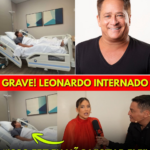1. The Prodigy of La Raza Hospital
Dr. Santiago Herrera was no ordinary doctor. At only 29, he had climbed faster than most in his field, boasting degrees from prestigious universities and a resume decorated with awards. He was known for his sharp mind, clinical accuracy, and unwavering confidence. Raised in a family of doctors, Santiago saw medicine as both a science and a ladder to personal prestige. He walked the hospital corridors with a white coat like armor, exuding a subtle disdain for anything outside Western medical logic. Especially skeptical of indigenous beliefs, he often rolled his eyes at what he called “grandmother remedies” and “jungle witchcraft.” He believed he knew best—until one day, that belief was torn apart.

2. The Arrival of a Silent Woman and Her Watchful Grandson
That Monday morning was busy at General Hospital La Raza, like most days. The emergency ward buzzed with coughing patients, whirring machines, and impatient nurses. Amid the crowd, an elderly indigenous woman was wheeled in, visibly in pain. Her name was Esperanza, and she spoke little Spanish. Beside her stood Mateo, her 12-year-old grandson with sharp eyes and quiet composure. He explained, calmly and clearly, that his grandmother had been experiencing intense, localized abdominal pain for days—pain that seemed to shift locations. Santiago glanced at the boy, mildly amused by his presence. “We’ll handle it,” he said dismissively, not realizing that the child beside him understood more than he could imagine.
3. Between Science and Superstition
Santiago began the clinical examination, noting that Esperanza had a low-grade fever, mild jaundice, and tenderness in the right upper quadrant of her abdomen. “Classic gallbladder inflammation,” he muttered. Mateo interrupted softly: “She says something is moving inside her.” Santiago raised an eyebrow and smirked. “That’s not how the body works,” he replied, barely hiding his mockery. To him, such descriptions were the stuff of myths and folk tales. But Mateo insisted. “It’s not superstition,” he said, “it’s a real illness. I think I know what it is.” Santiago scoffed. “This is medicine, not storytelling.” The nurses, uncomfortable, watched silently as cultural arrogance began to shadow clinical judgment.
4. A Challenge From a Boy With a Notebook
As Santiago prepared to order routine tests, Mateo took out a worn notebook—filled with hand-drawn diagrams, symptoms, and notes in both Spanish and Masawa. He pointed to a page and said, “I think it’s a parasite, a worm that’s moved into the bile duct. My grandmother had this before. Her sister died from it because no one believed her.” Santiago stared, half annoyed, half intrigued. “You’re not a doctor,” he said coldly. Mateo stood his ground. “Then make me a deal. If you cure her without knowing what she has, I’ll never interrupt again. But if I’m right, you promise to listen.” The room fell into a heavy silence. Santiago, amused and prideful, nodded.
5. Biliary Ascariasis: A Diagnosis From the Margins
Mateo calmly explained that his grandmother had likely contracted Ascaris lumbricoides, a parasitic worm common in rural areas. Based on symptoms—localized moving pain, fever, bile retention, and past experiences—he believed it had entered the bile duct, causing a rare condition: biliary ascariasis. He named the treatment: albendazole followed by possible endoscopic extraction. Santiago blinked, stunned by the specificity. “Where did you learn all this?” he asked. “From books, from school, and from her stories,” Mateo replied. For the first time, the boy’s words were no longer dismissed as folklore but recognized as something disturbingly close to clinical truth. The doctor ordered advanced tests—not because he believed the boy, but to prove him wrong.
6. The Turning Point in the Blood and the Eyes
The ultrasound revealed an unusual tubular shadow in the bile duct. Liver enzymes were elevated. Her eosinophil count was higher than normal—signs Santiago had missed in his rush to a more common diagnosis. A CT scan confirmed it: a foreign object, long and thin, moving inside the duct system. The parasite was real. Santiago’s face paled. Esperanza’s condition was worsening. Had he not listened, she might’ve gone into septic shock. “You saved her,” a nurse whispered to Mateo. Santiago, watching the monitors, felt a sensation he hadn’t felt in years: shame, not for being wrong, but for not listening.
7. A Professor Humbled by a Pupil
Santiago consulted Dr. Ramírez, the hospital’s lead gastroenterologist. After reviewing the scans and symptoms, the senior doctor confirmed Mateo’s diagnosis. “This boy may not have a degree, but he has instinct, knowledge, and observation skills that many doctors lack,” Ramírez said. Santiago looked at Mateo—no longer a child, but a colleague in this moment. “How did you know all this?” he asked again. “Because I watched, listened, and remembered,” Mateo said. His knowledge had come from a place of necessity, not theory—from community clinics, biology classes, and his grandmother’s survival stories. He had been learning medicine his whole life. Just not from a university.
8. The Worm, the Screen, and the Silent Victory
Esperanza underwent an endoscopic retrograde cholangiopancreatography (ERCP), during which doctors extracted a 20-centimeter Ascaris worm from her bile duct. The entire team watched as the parasite was displayed on the screen, writhing faintly before being removed. Mateo said nothing, only nodding slightly. Santiago felt a mix of awe and regret. The very idea he had laughed at—”a worm moving inside her”—was now on a stainless steel tray. He walked to the recovery room, where Esperanza lay sleeping. He turned to Mateo and quietly said, “You were right. I was wrong.”
9. The Lesson Beyond Medicine
When Santiago offered to help Mateo get into medical school, the boy shook his head. “I don’t want to be a doctor because I won a bet,” he said. “I want to become one because I love healing people. But you… you need to learn too. Not from me—from everyone you don’t listen to.” His words struck deeper than any textbook. Santiago realized that being a healer wasn’t just about mastering the body—it was about respecting knowledge in all its forms, whether from a university or a grandmother in the hills. That day, Santiago made a promise to himself: to relearn medicine through humility.
10. Two Healers, Two Worlds, One Mission
Months later, Santiago had changed. He enrolled in an ethnomedicine program, began learning Masawa from Mateo, and started working with local clinics to bridge ancestral healing with modern science. Mateo, now 13, visited the hospital regularly—first as a learner, later as a teacher. Together, they co-wrote an academic paper titled “Biliary Ascariasis and Cultural Dismissal: A Case for Listening”, which was published in a major Latin American medical journal. More importantly, they proved that the best medicine isn’t about who knows more—but who listens better. In a world divided by class, language, and pride, a doctor and a boy had found common ground—not in a hospital bed, but in truth.
News
Virgínia Rompe o Silêncio Sobre Leonardo no Hospital e Revela Mágoa Que Ninguém Imaginava
A segunda-feira começou tensa para o mundo sertanejo e para milhões de seguidores atentos a cada movimento da família Costa….
Virgínia rompe o silêncio, se recusa a visitar Leonardo no hospital e expõe ferida que vinha crescendo dentro da família
A madrugada de segunda-feira começou diferente. Ainda antes do sol nascer, portais de Goiás noticiaram que Leonardo havia sido internado…
Sumiço de Neymar em Paris e Story de Biancardi Acendem Alerta: Coincidência ou Recado Silencioso?
O silêncio, às vezes, fala mais alto do que qualquer pronunciamento. E foi exatamente esse silêncio que transformou a ausência…
O silêncio de Neymar, o sumiço repentino e a indireta de Biancardi que deixou tudo ainda mais tenso
Tudo aconteceu de forma silenciosa demais para ser normal. Sem anúncio oficial, sem justificativa clara e sem aquela movimentação típica…
O pedido inesperado das Marias para o Natal deixa Virgínia sem reação e derrete a internet
O clima já era de festa, casa cheia, risadas espalhadas pelos cômodos e aquele barulho gostoso de família reunida quando…
O Pedido de Natal das Marias que Deixou Virgínia em Choque e Derreteu a Internet
O Natal ainda nem chegou, mas um momento simples dentro de casa foi suficiente para emocionar, arrancar risadas e surpreender…
End of content
No more pages to load









